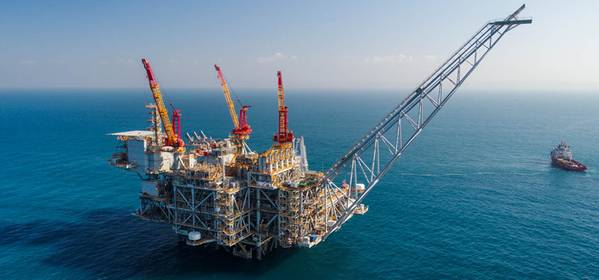
Chevron Mediterranean, a subsidiary of the U.S. oil giant Chevron, has informed that the works on the Leviathan field that would expand its gas production have been postponed due to the escalation of security situation resulting from the Israel-Gaza war.
The expansion works on the Leviathan field, which would involve the laying of the third subsea transmission pipeline to the platform, have been suspended for six months, until April 2025 as the Israel-Gaza war continues, according to NewMed Energy, a partner in the project along Chevron Mediterranean, and Ratio Energies.
The third transmission pipeline would allow the expansion of the maximum gas supply capacity from the Leviathan project to INGL’s transmission system from approximately 1.2 BCF per day to around 1.4 BCF per day.
“Due to escalation of the security situation, the work on laying the subsea pipeline as part of the Third Gathering Pipeline Project has been suspended until April 2025 or thereabouts, depending on the performing contractor's time tables and work schedule, and on the regional security situation.
"Therefore, in the operator’s estimation, a delay of at least 6 months is expected in completion of the Third Pipeline Project,” NewMed Energy said.
“Chevron Mediterranean Limited (CML) continues to work with the government of Israel, our contractors and all stakeholders to progress efforts to expand the production capacity from Tamar and Leviathan in order to meet growing domestic and regional demand.
"Any questions regarding the security situation should be directed to the Government of Israel," Chevron said in a statement.
The announcement comes two months after the partners adopted an investment decision of $429 million for the front-end engineering (FEED) phase and preliminary procurement of long lead items in support of the increase of the system’s total gas production capacity to a total of up to approximately 21 billion cubic meters (BCM) per year.
At the time, the partners in the Leviathan project said they also exploring the possibility of laying a fourth subsea transmission pipeline from the field to the platform, enabling a maximum daily production capacity of around 2,350 MMCF.
The Leviathan gas reservoir was one of the world's largest deep-water gas discoveries of 2000-2010, and its development is the largest energy project in Israeli history.
The gas field is located deep in the Mediterranean Sea, 130 km west of Haifa.
The reservoir's development entailed the drilling of four production wells to an average depth of 5 kilometers below sea level, the laying of a subsea transmission pipeline, and the construction of dedicated offshore processing facilities.